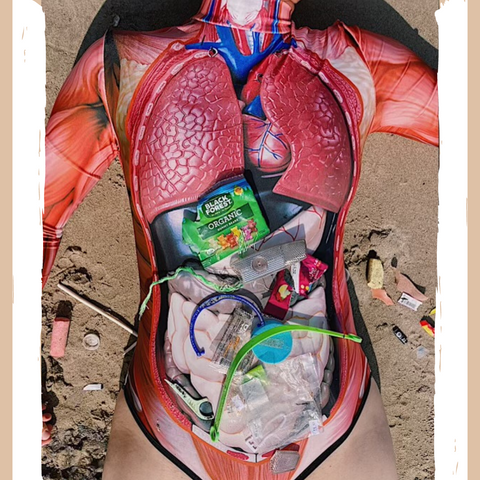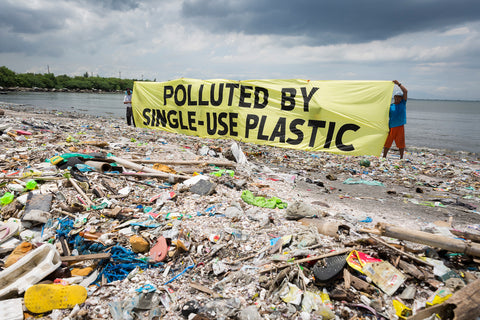Your Cart is Empty
Switch to Kind Cup for a "Better Period, Better Planet!"
Switch to Kind Cup for a "Better Period, Better Planet!"
Switch to Kind Cup for a "Better Period, Better Planet!"
Your Cart is Empty
July 06, 2021 5 min read
Is it time to ban single-use plastics?
Written by: Christine Brown & Amanda Luke
Once you've seen an image of a bird or a whale with their bellies filled with plastics, it's overwhelmingly clear - humans have created a serious problem.
But did you know that we, humans, are also eating startling amounts of plastics every week in the form of microplastics? Microplastics are contaminating numerous food sources from the seafood we eat to the water we drink. “Based on a study commissioned by WWF and carried out by University of Newcastle, Australia, people are consuming about 2000 tiny pieces of plastic every week. That’s approximately 21 grams a month, just over 250 grams a year.”
To put this into context, that’s like eating one credit card of plastic a week!

Plastics gathered from a beach walk placed on top of the torso of a person wearing a bodysuit laying on top of the sand in a similar manner to the images of wildlife killed from ingesting plastic.
Image source: Christine Brown
And even if you decide to opt out of eating seafood, according to an article in The Lancet, “analysis of tap water samples from around the world found that a high proportion of drinking water is contaminated with microscopic fragments of plastic (83% of samples collected worldwide, but up to 94% in the USA)."
How is there so much microplastic everywhere?
According to the NRDC, we produce 300 million tons of plastic each year worldwide, half of which is for single-use items.

Image source: https://en.wikipedia.org/wiki/Victrex
Marine animals are the most impacted by this, and many have been found deceased with stomachs full of plastic waste. According to the NRDC, “recent studies found plastic in the guts of 90 percent of the seabirds tested and 100 percent of the turtles. Alarmingly, scientists estimate that there will be more plastic than fish in the ocean by weight in 2050”
Single-use plastic waste has severe consequences for both the environment and humans.
Microplastics are ending up in our waterways, killing marine life, and being ingested by humans. According to earthday.org, “single-use-plastics frequently do not make it to a landfill nor are they being recycled. A full 32% of the 78 million tons of plastic packaging produced annually flows into our oceans; the equivalent of pouring one garbage truck of plastic into the ocean every minute.”

Image source: https://2020.igem.org/Team:UCL
Our addiction to cheap, convenient throw away items is ingrained in our society. On average, we use a single-use plastic product for just 12 minutes before discarding it, yet it takes nearly 1,000 years for it to break down.
Further, vulnerable communities are often impacted disproportionately as wealthier countries often export their recycled plastic to developing countries to process. In Southeast Asia, for example, incinerating this imported plastic creates toxic fumes that can cause rashes and cancer, not to mention the destruction of the land itself.
If we know it’s bad for us, why is it produced in the first place?
It is cheaper for manufacturers, companies, and organizations to produce plastic. Using plastic allows them to prioritize increasing profits over more responsible and sustainable material alternatives.
Here in the United States, comprehensive federal legislation banning the use of single-use plastics can help mitigate the devastating effects of single-use plastic waste on the environment, wildlife and humans.
Congress can pass sweeping legislation banning the use of single use plastics, holding manufacturers responsible for their plastic production and incentivizing companies to reduce plastic pollution. These efforts are outlined on earthisland.com:
“members from Frank G. Wells Environmental Law Clinic at UCLA and ocean conservation organization Surfrider Foundation, specifically recommended that Congress craft federal legislation banning single-use plastic products such as bags, straws, and expanded polystyrene foam food containers. They also called for establishing “extended producer responsibility” schemes, which hold plastic manufacturers responsible for the waste they create.”
It’s been suggested that producers of single-use plastic, not the consumers who are left to deal with the packaging those manufacturers and companies created, should fund waste and recycling programs, and that any manufacturers, distributors and importers who violate single-use ban laws should be penalized.

Image source: inhabitingtheanthropocene.com
Many local municipalities, states and other countries have already taken this step, specifically with plastic bag bans. This has led to a significant decrease in single use plastic usage across the world. The next step is to enact these efforts federally in the United States.
Rwanda, a pioneer in banning single-use plastic bags, is now one of the cleanest nations on earth. – UNEP “A Roadmap for Single Use Plastics”
If a small startup can take action, then large companies have no excuses.
From the start, Kind Cup founder, Christine Brown, wanted to commit to being 100% plastic free from manufacturing to menstruation - with all aspects of the process and packaging. Months before launching in November of 2019, one of the final steps was to order a small sticker to seal the menstrual cup package. While sealing the package when being assembled by a team in an FDA registered facility is not required by the FDA, due to the nature of the product, Brown preferred the menstrual cup package to arrive sealed for customers.
When attempting to order a plant-based clear sticker, Brown discovered that there were no options for an unbranded sticker to meet the needs of sealing the small box. When finally finding a source able to do it, the lead time on an order was several months, with a minimum order quantity of 500,000 stickers. This was not feasible as a small, bootstrapped startup. Despite the desire to be 100% plastic-free from the launch, to keep on schedule, the product launch ended up including small plastic stickers to seal the box.
Now, with the expanded product line, Kind Cup has sourced a paper sticker alternative, and is now 100% plastic free! But this experience reinforced the importance of continuing to raise awareness and take action at whatever scale possible.

Image source: Kind Cup
Ultimately, the technology exists and is constantly improving for sustainable, plant-based alternatives to plastics. Should legislation be put into place, and consumers demand that companies and large corporations take responsibility and stop producing single-use plastics in the first place, we can all benefit from a healthier and more sustainable future.
After all, if Kind Cup, a small, bootstrapped startup can make the commitment to being plastic free, then larger companies can figure out how to make it work - they just have to be willing to prioritize doing the right thing over personal profit.
Sources:
Crafting a Federal Ban on Single-Use Plastics. Earth Island Journal. (n.d.).
https://www.earthisland.org/journal/index.php/articles/entry/single-use-plastics-pollution-law.
October 1, 2017. Microplastics and human health - an urgent problem. The Lancet Planetary Health.
https://www.thelancet.com/journals/lanplh/article/PIIS2542-5196%2817%2930121-3/fulltext
January 09, 2020 C. L. (2021, April 20). Single-Use Plastics 101. NRDC.
https://www.nrdc.org/stories/single-use-plastics-101.
MValliant. (2020, June 8). Federal Lawmakers Introduce First-Ever Bill To Reduce Single-Use
Plastic Nationwide. Oceana USA. https://usa.oceana.org/press-releases/federal-lawmakers-introduce-first-ever-bill-reduce-single-use-plastic-nationwide.
Revealed: plastic ingestion by people could be equating to a credit card a week. WWF. (n.d.).
https://wwf.panda.org/wwf_news/?348337%2FRevealed-plastic-ingestion-by-people-
could-be-equating-to-a-credit-card-a-week.
You can add a content block like this to your blog article sidebar, and use it for more details about blog authors, for example.
Sign up to get the latest on sales, new releases and more …
Signup for special sales, tips, insider info on the brand journey, and more!
